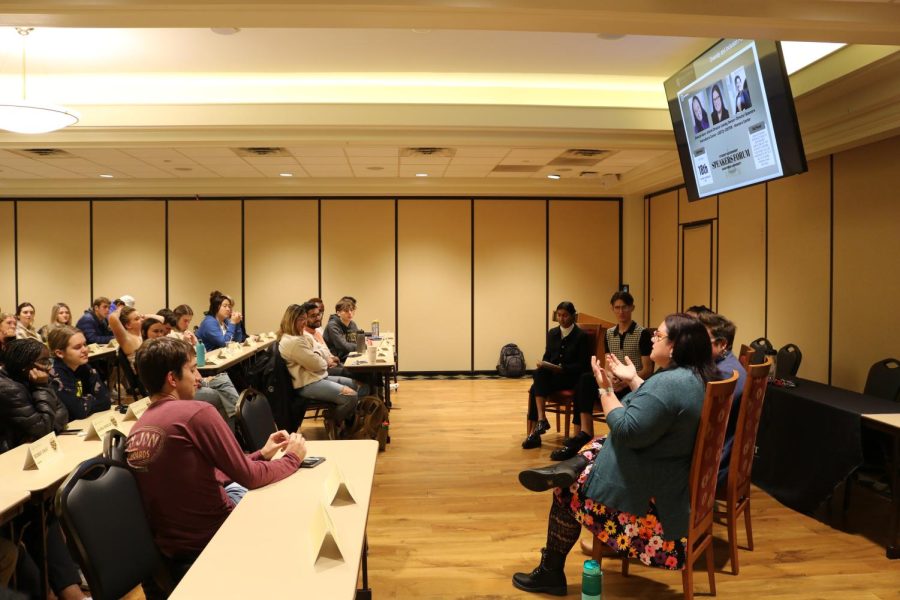Student Government hosts D&I panel
The directors of the Intercultural Center, Women’s Center and LGBTQ+ Center attended a Student Government Senate meeting
Courtesy of Student Government
Student Government Senators listen to a talk from Intercultural Center Director Monique Gore, Women’s Center Director Shelley Sizemore and LGBTQ+ Center Director Kayla Lisenby-Denson.
October 22, 2022
Intercultural Center Director Monique Gore, LGBTQ+ Center Director Kayla Lisenby-Denson and Women’s Center Director Shelley Sizemore attended Student Government Senate on Tuesday, Oct. 18 to discuss their vision to make Wake Forest a more welcoming space for all students.
As all three directors have been in their position for less than five months, they are eager to address concerns and inquiries about their roles. Student Government Diversity and Inclusion (D&I) co-chairs Hannah Elluru and Michael Walsh asked a series of questions to guide the conversation.
The panel began with each director describing their program and resources.
The Intercultural Center, according to Gore, is a “cultural enriching opportunity for all students.” It encompasses various programs such as heritage months and identity development initiatives, which support student advocacy and marginalized groups on campus.
Along with Gore, Sizemore described the Women’s Center’s aim as “having a conversation about what gender is, what it means to the world and how that varies from person to person.” She also highlighted that the programs offered by the Women’s Center are designed to unpack gender and navigate bodily experience.
Likewise, Lisenby-Denson described the LGBTQ+ Center as “advocates for inclusive policies and practices across institutions.”
One significant project that the LGBTQ+ Center is currently working on, according to Lisenby-Denson, is the task force on names, gender, and data systems.
Once implemented, the plan allows every student and faculty to change their name across all campus data systems, from copy machines to registrar, to their preferred one. Name is a crucial part of identity that can create biased assumptions, especially for transgender students and international students. By renewing the system, Lisenby-Denson wants to help students engage in gender and sexuality more broadly, thus increasing inclusion and respect.
While explaining the specific area of advocacy that the centers focus on, all three directors stressed that they embrace students of any identity and background.
“We don’t look at students as a monolith,” Gore said. “We understand that students have different races, ethnicity, gender, and class, and we take all of those things into consideration when thinking about our program and support services.”
A commonality across all three centers is that they empower certain identities that the students identify. However, the encouragement of disclosure comes with the question of what measurement can be taken to ensure the center is a safe space for students.
“We work to make a really open space where people can come in without judgment or without assumptions made about who you are or why you’re there,” Lisenby-Denson said. “I do not lock my office, and our staff is always happy to meet people wherever they would like to meet.”
Next, the three directors and the D&I co-chairs discussed the greatest challenges faced by Wake Forest as an institution. One of them, according to Sizemore, is the rigidity of campus tradition.
“I think that’s a barrier,” Sizemore said. “We could do a better job of asking if all of our traditions align with our values, just like what we do with renaming four roads after important people that make our history — opening ourselves up to make new traditions. That’s the fun of working on a college campus. ”
For the potential areas of improvement in inclusion, Gore mentioned that Wake Forest is putting emphasis on the recruitment of students of color but not retention.
“When it comes to living in a residence hall or being in the classroom, there are a lot of biased incidents that have been in these living-learning spaces due to the fact that diversity is a check box,” Gore said. “We need to think about the culture and the environment that we want to continue to cultivate, and make sure we are truly creating an environment where marginalized students feel like they are getting the experience as much as those from the dominant group.”
Members of the Student Government found the conversation informative but also inspiring.
“It was really helpful to be introduced to faculty in their new positions,” sophomore Shelby Balmer, a sophomore senator on the SOC Committee, said. “I really like the part when Director Gore talked about identity not being a monolith — it enables us to shape ourselves in a collaborative approach with these centers.”
The D&I panel is the third meeting hosted by Wake Forest Student Government this semester since Sept. 20. The panel is held every Tuesday, mandatory for every Student Government member, and open to all students.
On Oct. 25, the speaker forum will welcome Wake Forest University President Susan R.Wente to discuss her plan to lead the campus forward. For more information, you can visit the sg.wfu.edu website or @wake_sg on Instagram.






















